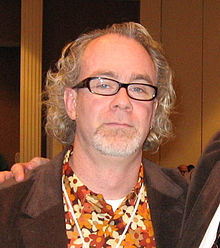William Shunn | |
|---|---|
 William Shunn at the 2007 World Fantasy Convention | |
| Born | Donald William Shunn II August 14, 1967 Los Angeles, California, U.S. |
| Occupation | Short story writer |
| Education | University of Utah (BS) |
| Period | 1993–present |
| Genre | Science fiction |
| Website | |
| www | |
William Shunn (born August 14, 1967) is an American science fiction writer and computer programmer. He was raised in a Latter-day Saint household, the oldest of eight children. In 1986, he served a mission to Canada for the Church of Jesus Christ of Latter-day Saints, but was arrested for making a false bomb threat, for the purpose of preventing his fellow missionary from returning home. [1]